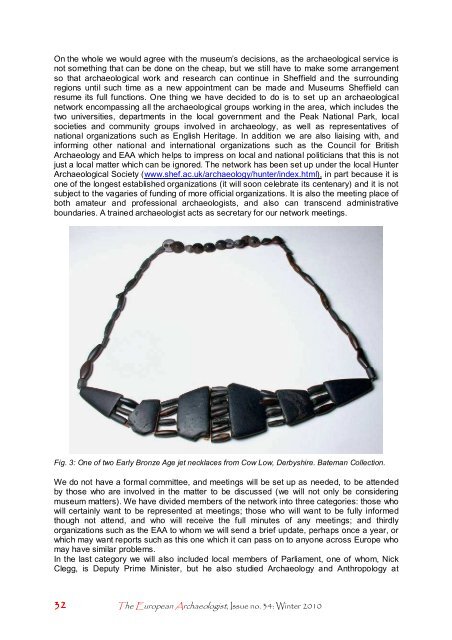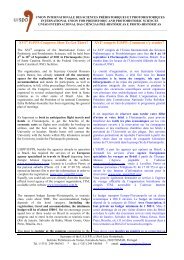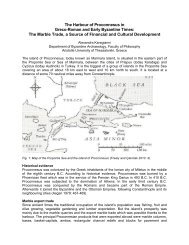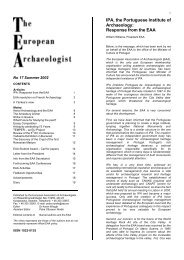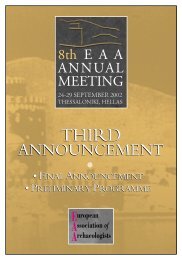TEA 34 - European Association of Archaeologists
TEA 34 - European Association of Archaeologists
TEA 34 - European Association of Archaeologists
Create successful ePaper yourself
Turn your PDF publications into a flip-book with our unique Google optimized e-Paper software.
On the whole we would agree with the museum’s decisions, as the archaeological service is<br />
not something that can be done on the cheap, but we still have to make some arrangement<br />
so that archaeological work and research can continue in Sheffield and the surrounding<br />
regions until such time as a new appointment can be made and Museums Sheffield can<br />
resume its full functions. One thing we have decided to do is to set up an archaeological<br />
network encompassing all the archaeological groups working in the area, which includes the<br />
two universities, departments in the local government and the Peak National Park, local<br />
societies and community groups involved in archaeology, as well as representatives <strong>of</strong><br />
national organizations such as English Heritage. In addition we are also liaising with, and<br />
informing other national and international organizations such as the Council for British<br />
Archaeology and EAA which helps to impress on local and national politicians that this is not<br />
just a local matter which can be ignored. The network has been set up under the local Hunter<br />
Archaeological Society (www.shef.ac.uk/archaeology/hunter/index.html), in part because it is<br />
one <strong>of</strong> the longest established organizations (it will soon celebrate its centenary) and it is not<br />
subject to the vagaries <strong>of</strong> funding <strong>of</strong> more <strong>of</strong>ficial organizations. It is also the meeting place <strong>of</strong><br />
both amateur and pr<strong>of</strong>essional archaeologists, and also can transcend administrative<br />
boundaries. A trained archaeologist acts as secretary for our network meetings.<br />
Fig. 3: One <strong>of</strong> two Early Bronze Age jet necklaces from Cow Low, Derbyshire. Bateman Collection.<br />
We do not have a formal committee, and meetings will be set up as needed, to be attended<br />
by those who are involved in the matter to be discussed (we will not only be considering<br />
museum matters). We have divided members <strong>of</strong> the network into three categories: those who<br />
will certainly want to be represented at meetings; those who will want to be fully informed<br />
though not attend, and who will receive the full minutes <strong>of</strong> any meetings; and thirdly<br />
organizations such as the EAA to whom we will send a brief update, perhaps once a year, or<br />
which may want reports such as this one which it can pass on to anyone across Europe who<br />
may have similar problems.<br />
In the last category we will also included local members <strong>of</strong> Parliament, one <strong>of</strong> whom, Nick<br />
Clegg, is Deputy Prime Minister, but he also studied Archaeology and Anthropology at<br />
32<br />
32<br />
The <strong>European</strong> Archaeologist, Issue no. <strong>34</strong>: Winter 2010


